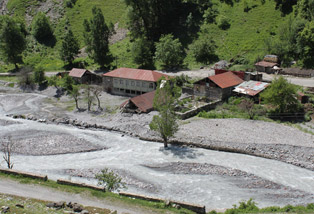Salome Achba, http://humanrightshousetbilisi.wordpress.com
Last week, Human Rights House Tbilisi organized a study trip about eco-migrants to Mleta village for journalists. I was glad to be accepted as a participant in the trip.
Mleta is one of the villages in Dusheti district. I was in high mood from the early morning. I was enjoying and taking photos of beautiful landscape of Dusheti district on our way to the village. Time-by-time Rezo Getiashvili from the Caucasian Environmental NGO Network (CENN) was showing places attacked by landslide and regretted that the region is one of the most dangerous places for natural disasters and unless preventive measures are taken here, we might receive much worse results.
I could not imagine that our arrival in Zemo Mleta could change my mood. It is eight-family settlement on the Aragvi River. Awhile, particularly in spring, when snow starts melting, the Aragvi River gets flooded. Simultaneously, the torrent coming from mountains blocks Aragvi River just in front of the settlement and in several minutes Zemo Mleta gets flooded.
Most houses in Zemo Mleta are two-storied stone buildings. However, ground floors of most of them are covered with scree and are not visible on the surface.
Having arrived in Mleta, we first conversed with grandmother of Khatia Nazgaidze, 3, who fell into flooded Aragvi River last year and died. Her and about other 15 families living in Zemo Mleta shall be immediately evacuated from the area.
Villagers told us as soon as flood season starts, local people start watching the river day and night in order to timely warn the village about upcoming danger.
Although Mleta has been coping with natural disasters for dozens years, evacuation process of local people has not launched yet.
“Unfortunately, the state has not expressed kind will to assist these people yet. We and other organizations have released several recommendations and announced that presence of population in the area is dangerous and they should be immediately evacuated,” Rezo Getiashvili said and added that river level can rise any moment here.
Journalists participating in study trip met representative of the local self-government Ioseb Zakaidze. He said the government intends to assign 7-7 thousand lari to each family in Mleta village by the end of the year.
“The sum is already transferred. However, initially we should resolve the problem of plots. The local population decided not to accept money before the territory of new settlement is not subordinated to the Dusheti district administration; nowadays it is within the jurisdiction of Kazbegi district administration,” Zakaidze said.
Besides practical problems, regulation of the domestic law about eco-migration is still a problem. So, supposedly problems of Zemo Mleta residents will not be resolved with their resettlement into a new village.
According to the UN guidelines, people displaced as a result of natural or artificial disasters are also recognized to be IDPs. However, Georgian law does not recognize eco-migrants to be IDPs. Consequently, eco-migrants do not enjoy same social benefits as internally displaced people as a result of conflict situations.




